Landscaping Marketing Strategy: How to Grow Your Landscaping Business
Do you want to grow your landscaping business? This guide will walk you through all the essential elements of a landscaping marketing strategy that will help you gain more leads.
Landscaping Business Marketing Strategy Basics
In the current economy, fewer homeowners have the means to improve or revamp their backyards. The competition is getting fiercer.
It’s time for your company to change how you promote your services and win new customers. This guide on proven marketing strategies for the landscaping business will help you in several ways:
- Grow traffic to your website.
- Attract your ideal customer.
- Increase conversions.
- Grow sales and revenues.
Buckle up, as we have tons of information to unpack.

Building Landscaping Marketing Strategies Step-by-Step
Planning is the cornerstone of the success of marketing strategies. It will help you optimize the use of your time, efforts, and budget. It will also help you achieve your goals more efficiently while avoiding basic mistakes. The steps in strategy planning are:
- Define marketing budget.
- Set attainable goals for your landscaping company.
- Choose marketing channels.
- Set KPIs and a clear timeline.
- Plan activities for each marketing channel.
- Assign roles within your marketing team.
- Acquire tech stack.
- Analyze and change the strategy.

Digital Marketing Strategies for Contracting Businesses
This guide was created by the marketing and SEO experts of the dNOVO Group marketing agency. We’ve prepared a series of guides to help contracting businesses build marketing strategies and improve client acquisitions. Check out other marketing materials in the series:
- Roofing Marketing
- Roofing SEO
- Contractor Marketing
- Contractor SEO
- Construction Marketing
- Construction SEO
- Landscaping SEO
- Home Remodeling Marketing
- HVAC Marketing
- Plumbing Marketing
- Windows & Doors Marketing
How to Market a Landscaping Business: Components of Strategy
The essential components of landscaping business marketing include:
- Analyzing your current positions and growth opportunities.
- Developing a landscaping website to attract and impress potential customers.
- Doing landscaping SEO to increase website traffic.
- Creating a content strategy to support SEO and educate potential clients.
- Engaging in social media marketing to reach out to your target audience and build a community.
- Paid Advertising to boost the outreach to potential customers.
- Email campaigns to warm up leads and retain existing customers.
In the next sections of this landscaping marketing guide, we’ll cover every area from this list in detail.
Analytics-based Marketing for Landscaping Companies
Before you begin crafting a landscaping marketing strategy, you need to do a lot of analytics to understand your competition, your customers, and the effectiveness of your own efforts.
Gather a list of the top ten competitors in the area and analyze them across marketing tools to find out what strategies they use and how effective they are.
Analyze your own performance with marketing tools and the tools you already use, like Google Analytics and Google Search Console. Look at key performance metrics and gauge whether they meet your goals.
Finally, create an ideal customer profile and customer journey. To create an ICP, use data from your sales department and talk to the representative. Understand who your most common customer is, what their typical problems are, and what solutions they need.
Build an understanding of the customer journey by using website engagement data and doing customer interviews. You need to find out how they go from wanting something done to choosing your company, and what areas of that process you can improve.
All of this information will help you create a landscaping marketing strategy that focuses on your strengths and targets your customer base.
Website as the Basis of Your Digital Marketing Landscaping Strategy
In many cases, your website will be the first touchpoint of your potential clients with your landscaping business. You need to make sure it provides all the necessary information to the visitors and can be found on the search engines.

When planning your website, remember that your website should achieve several goals:
- Provide all the necessary information about your business to potential customers.
To attain this goal, you need to list the landscaping services your company provides, your service area, and your contact data.
- Convert visitors to leads.
You need to convince customers that your landscaping business is worth working for by providing examples of your work and showcasing reviews. Place CTA buttons, leave your telephone number in highly visible places and make it dialable on click, and create book consultation widgets for people to set up an appointment easily.
- Attract SEO traffic.
You need to optimize your website and your content for the search engines.
- Establish your landscaping business as an expert in the field
You need to create high-quality content showcasing how you work and your completed project.
- Gain the trust of prospective clients.
Share your rating on a review website, an online review of a satisfied customer, or a testimonial.
Key Elements of Landscaping Websites
Here we discuss the essential elements of a good website for a landscaping business.
Home Page
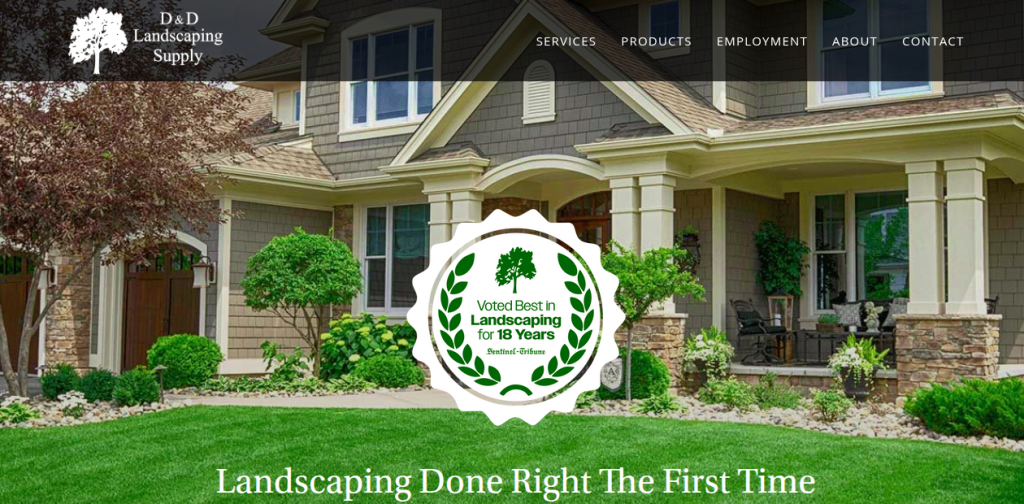
The home page acts as a central hub for navigating your website and can highlight one element of your business to the customers. This website chose to display its unique selling point — an award. You can also show select customer reviews, blurbs from news media you’ve received, or a contact form to get a free quote from you.
Menu
The menu helps customers navigate your website more efficiently. Create a menu that’s easy to use and include all the important pages in it. Consider creating a drop-down menu to list more subcategories.
Landscaping Services Pages
Create a separate page for each landscaping service you provide, explain the service in detail, and provide photos of landscaping jobs your company has done. It will help your SEO efforts by focusing each page on a separate keyword.
Service Area Pages
If your business operates in a small area, you can simply add its name to the service pages and the main page. If you serve multiple areas, you’ll need to create a landing page for each area. Consider making them for large cities, neighbourhoods, or municipalities.
This way, local customers can find your business and be sure you can help them with landscaping without having to call.
Gallery

This page, also often called “portfolio” or “projects,” is not intended to be found on Google. Instead, it means to showcase your work and convince the customer you are qualified to help them. Consider adding scenic shots of your work, before and after photos, and a couple of videos of your best work.
You can also create a separate page for each case you want to highlight and explain what exactly you have done on the property, what the budget was, how quickly you were able to do it, and what the customer says.
Contact Us Page
Encourage customers to contact your landscaping company by leaving your contact information in a visible place across the website, typically at the top or on the bottom.
Create a dedicated page with all the contacts, a contact form, and a booking widget to give customers more options.
Search Engine Optimization for Landscaping Companies
SEO is one of the most efficient strategies of landscaping marketing to win more customers. It includes several techniques to promote website ranking in Google searches and increase the discoverability of the website on the Internet.
There are 5 main areas of SEO efforts:
- Keyword Research.
- Technical SEO.
- On-Page SEO.
- Off-Page SEO.
- Local SEO.
Finding the Right Keywords to Promote Landscaping Services
Search engines decide when to display your site based on the keywords present on the page. That’s why it’s critical to find the right keywords for your website. You choose the keyword you want to rank for and then build content around it.

You’ll likely add the two main keywords, your brand name, and a phrase like “landscaping services” organically as you write website content. There are multiple other keywords and keyword variations that you can add to rank for a wider range of search queries and gain more traffic.
Analyze keywords using the 3 main characteristics:
- Volume (the number of monthly searches).
- Difficulty (what’s required to get to the top).
- Intent (what type of content people expect to see).
You need to analyze all three characteristics at once in order to determine whether you are going to work with a keyword or not.

For example, it’s great to focus on a keyword with a high volume. However, if the difficulty is too high, getting to the SERP top will require too many backlinks from high authority websites, and you don’t have the budget or time for proper link building. This issue can be solved by finding a synonym with a lower volume and difficulty.
Analyzing search intent will identify the type of content you will build for a keyword. Blog posts are great for informational intent. Service pages and home pages are recommended for commercial and transactional intent.
You can go deeper in search intent analysis and look through the pages that rank for a keyword. For instance, this keyword looks promising, with decent traffic numbers and a doable keyword difficulty.

But when you look closer, you’ll see that the search intent is to find large lists of landscaping companies, not individual websites.
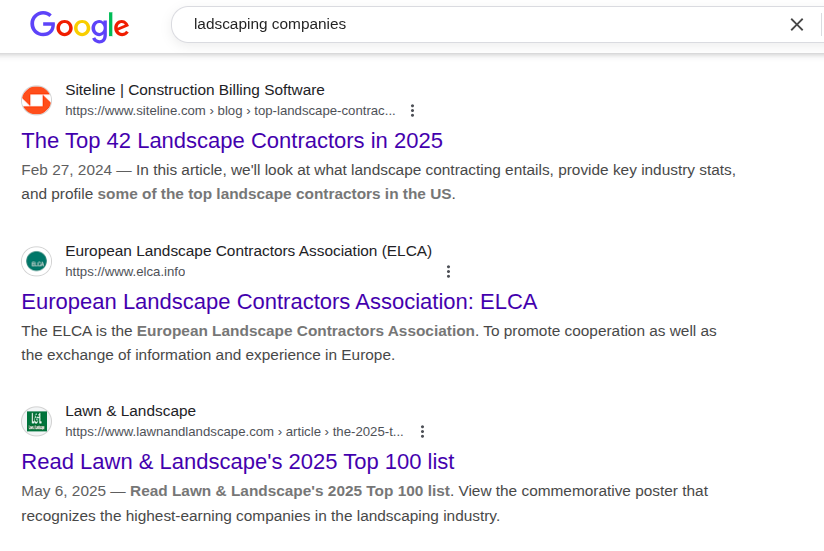
This means trying to rank your home page for this keyword might not bring you much traffic.
Don’t forget to pick LSI keywords for your content piece. These are keywords that you usually expect to find in a text on a certain topic, and they can show Google that your page is contextually relevant.
For example, if you write about natural stone, keywords like outdoor space, backyard, and paving are LSIs. Words like marketing materials, business cards, and brand recognition aren’t.
If you’re optimizing a landing page about ice and snow removal, your main keywords would be:
- Ice removal.
- Snow removal.
- Ice treatment solutions.
- Snow plowing.
- Clearing the driveway from snow.
- Sidewalk snow removal.
Some of your LSI keywords would be:
- Salt.
- Brine.
- Property.
- Foot traffic.
- Accessibility.
On-page SEO
Your content should be SEO-optimized to rank higher in Google and ultimately attain your landscaping marketing goals. This process is called on-page SEO. Add the focus keyword in the following places:
- The first paragraph of the text.
- First-level header (the content title).
- At least one second-level header.
- Meta title and meta description.
- Alt text of images.
- URL.
- Across the text of the page in an organic way.

Implementing Technical SEO
Apart from keywords, Google crawlers expect to see high-quality website performance and an exceptional user experience. This includes:
- Intuitive website navigation.
- Logically organized website architecture.
- No pages with no links pointing towards them.
- High loading speed.
- No broken links.
- Redirects only where necessary.
- No broken images or videos.
- No duplicate content.
- Mobile-friendly website.
- Good interlinking.
- Website security.
You can run a website analysis with the Chrome Lighthouse tool to see many technical problems with your site. It will give the site a score and highlight the problems you need to fix.
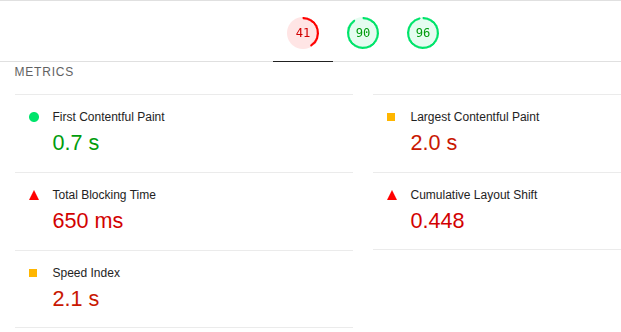
It also provides suggestions on what you can improve on your website to make it more up to Google’s standards.
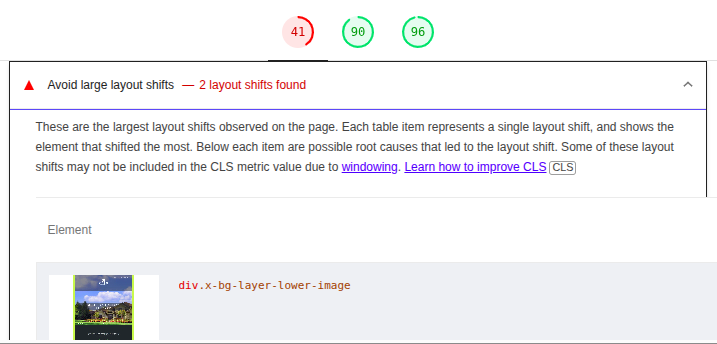
Off-Page SEO
Off-page SEO refers to the practices that help you establish your domain authority. Mostly, it’s to increase your brand recognition as well as get backlinks to your website.
Increasing website authority with backlinks helps your landscaping website rank higher in search engines. Checking the keyword difficulty with tools like SemRush will enable you to see how many referring domains you need to get to appear at the top of Google SERP.

Not all backlinks are good for your website’s SEO. There are plenty of shady websites. The backlinks from them will decrease your domain authority.
Find backlink opportunities by analyzing your biggest competitors with an SEO tool. Filter the list by domain authority metrics, number of backlinks, and total traffic.
Reach out to the website owners and try to get a link. Most commonly in the landscaping marketing, you’ll be working with directory links where you have to simply submit your website and business details, and with content marketing. Here, you’ll have to share your landscaping expertise in an article and link to your business from it.
Local SEO
Generally, landscaping businesses operate in a limited area. So, ideally, you only want to get local customers from this area.
There are two main practices in local SEO. First, you need to create and optimize landing pages for local searches, i.e., containing keywords with the names of particular geographical areas. For example, “garden pavement in Toronto.”
The second practice is for local landscapers to create Google Business Profiles. It will help you win new clients in your area. You will have your business page in Google, and it will also appear on Google Maps along with the essential business information (like opening hours, contact details, and reviews).
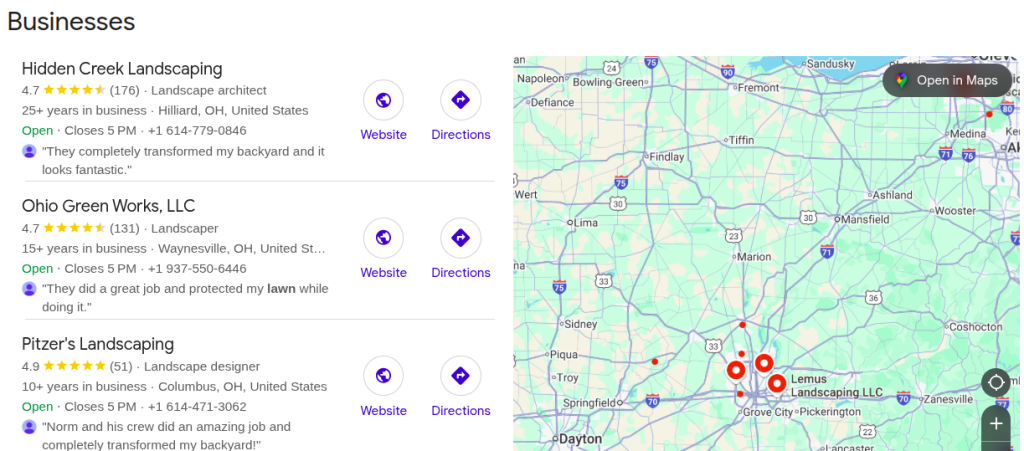
To improve your landscaping local SEO, focus on these key areas:
- Fully fill out your profile.
- Add keywords to the product description.
- Add multiple high-quality photos of your work.
- Add the areas you serve.
- Build local citations on directory websites with the correct name, address, and phone information.
- Invite customer reviews and respond to them.
- Create and optimize Google Business Profile posts.
Content Strategy to Engage and Convert Landscaping Customers
As mentioned above, content must align with your SEO strategy. Creating web pages and blog posts around specific keywords can help you get to the top of search results. Consequently, it will drive more traffic to your website.
However, good content goes beyond SEO purposes. It can help you convert website visitors into new customers.
Content Tips
Here’s how to market a landscaping business with content.

- Understand your customer
One of the best suggestions is to create a buyer persona, a short description of your ideal customer. It should include demographic data (age, marital status, income, etc.) and pain points.
This information will help you adjust your tone of voice and deliver more valuable content for your prospective clients.
- Apply storytelling
When people hear storytelling in marketing, they are often confused, associating it with creating a complex plot with multiple twists. In reality, it’s quite straightforward (as it should be!).
Talk about the problem. Next, talk about the ways to fix the problem. Finally, talk about your company as the best way to fix this problem.
- Build buyer journey
Content should convert website visitors into new customers. Even the best and most convincing article will not work if you do not provide the opportunity to take the next step. It can be a link to a service page or to an article further down the sales funnel.
Don’t leave your readers with a feeling that they’ve got everything they wanted from your website. Show them there’s more your website can offer.
- Reuse content
If you go multichannel, you can use the same content pieces across multiple platforms. You can reuse videos and photos on other platforms. Rewrite blog articles or use an LLM like ChatGPT to shorten them for social media posts.
Content Landscaping Marketing Ideas
We saw a number of landscaping companies struggling to find the right topics to write about or share on social media. This is a common problem for SMBs.
Professionals often lose the sense of novelty in their sphere. The common cognitive bias is “others know exactly what I know.” That’s why it might be hard to share the “landscaping tips” because to you, they seem obvious.
In this section, we provide 5 content marketing ideas for your landscaping business:

- Landscaping ideas & trends
In many cases, people start their buyer journey with a nagging feeling that they want to change something about their backyard. Many want to keep up with trends or simply see something new and exciting. Give them just that.
A long read with the current trends you saw online and from your previous and current projects can do good.
- Design & build how-to
Many people start with DIY projects in their backyards. However, not all of them go through with it, and even fewer get to finish. A good step-by-step guide on installing a fire pit in the garden can dissuade even the most eager people.
Finish your content piece with a detailed description of how your landscaping business can help them install the fire pit. You have good chances to convert right then and there.
- Maintenance tips
This is a good content idea for local businesses providing maintenance services. Write the best ways to keep the lawn evergreen, and then offer your lawn care services. It works in a similar way to design & build tips.
- Your work process
This type of content is mostly videos, but it can also be a blog post from the standpoint of one of your workers (or yourself if you work the projects for your customers). People love seeing others work. Many would watch for best practices. However, the majority consumes this type of content for the sheer pleasure of it.
- Before & After
Before & after photos are proof of the high quality of your work. Also, images attract people’s attention.

Landscaping Social Media Marketing Strategies
Social media marketing works well for a landscaping business since there’s a lot of content that has sharing potential. 68% of social media users follow their favorite brands, and amassing even a small following means some of them will reach out for your services eventually.
Several social media platforms will be good for promoting your landscaping company. Facebook is best to reach out to all demographics over 30. Instagram will work well for millennials. Finally, TikTok is great for millennials and Gen Z. Pinterest can be a great way to share pictures of your work.
TikTok and YouTube, as video sharing platforms, can require higher investments in producing content for them, but allow you to present a more in-depth look into your work and share it with the hopes of reaching a wide audience.

Benefits of social media marketing
Social media presence can benefit landscaping businesses in several ways:
- Harness the power of sharing.
- Tag your customers to get views from their social circle.
- Reach out to your ideal client at the early stage of their buyer’s journey.
- Work with negative feedback from unhappy customers.
- Amplify the positive feedback of your clients.
- Collaborate with influencers in landscaping to promote to their audience.
- Get traffic to your website.

Content to Share on Social Media Platforms
Here are the main types of content that work well with socials:
- Reused informational content.
- Special offers.
- Work progress.
- Project results.
- Client testimonials.
- Announcements (like participation in community events).
Here’s an example of what a social media post can look like for a landscaping company.
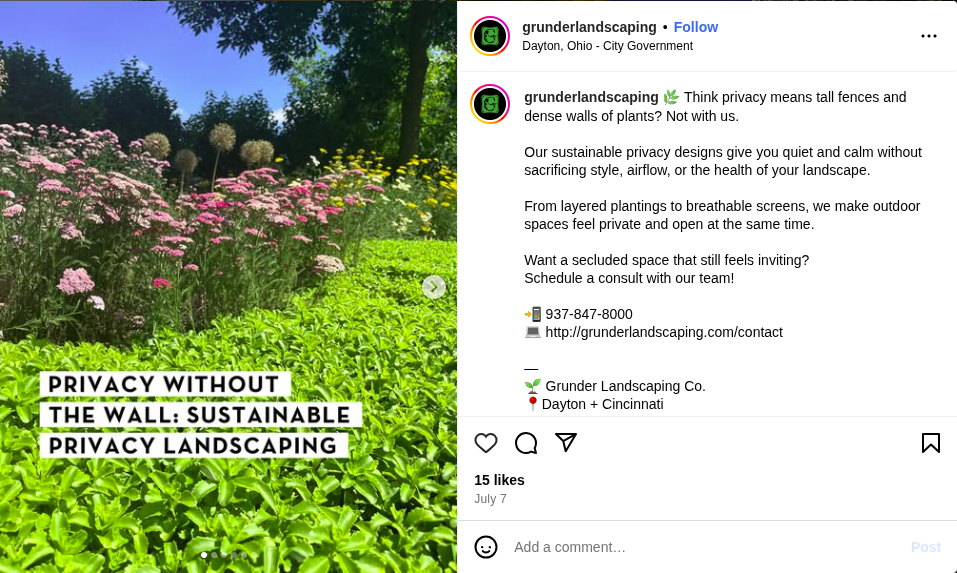
Your content is likely to gather fewer views and likes than that of a blogger who talks about their life, but in business social media, conversions matter more than virality. Foster a connection with the people who subscribe to you and build a trustworthy brand image because your subscribers are likely to turn to you first when they need landscaping.
Pay per Click Ads to Win New Clients for your Landscaping Company
PPC advertisement is a type of online ad where you pay per click (hence the abbreviation). It has become the most popular type of online ads, and many companies use it to promote their services.
The general practice is to create a specific landing page for the banner ads. However, many companies use their home page or service pages.
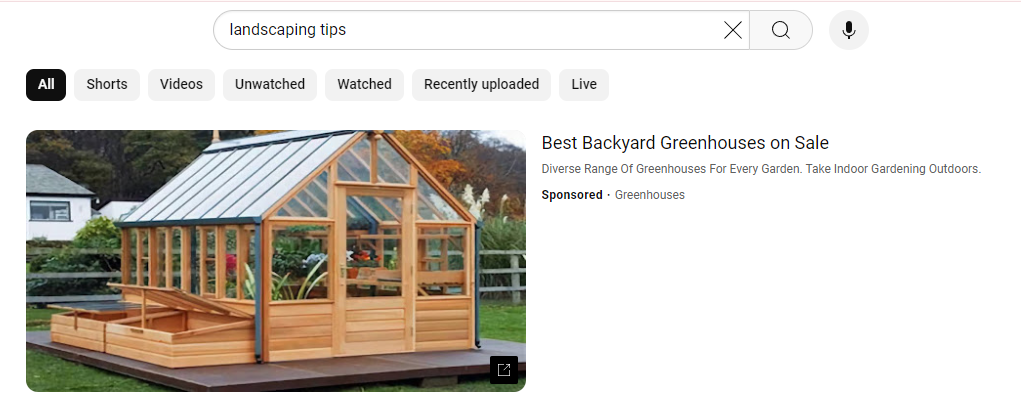
Benefits of PPC
PPC advertising has multiple benefits:
- You get website traffic.
- You get backlinks from high-authority websites.
- Your website gets to the top of SERP above organic results.
- You get high-quality leads that are searching for your services.
- You can target a specific audience.
- Your brand gets exposure even if people don’t click your links.
- PPC campaigns have high ROI
The major downside is that even with a decent ROI, all the traffic stops once you stop the ad campaign, unlike with organic marketing methods like SEO or social media marketing.
Types of PPC
The most widespread types of PPC are Google Ads and Facebook Ads. Facebook Ads appear on Facebook social media.
Google Ads is one of the largest banner ad sellers in the world. Your advertisement will appear:
- In Google SERP.
- In YouTube search results.
- On various websites.
We suggest that you first try only one type and monitor its performance. Once you’ve figured out what works and what doesn’t, you can add another type.
Email Marketing Campaigns for Landscaping Companies
A marketing manager uses email campaigns to attain several goals. In this section, we discuss these goals and explain how landscaping businesses can attain them.
Lead Warm-up
Marketers send emails to warm up leads. If you aren’t familiar with the term, here’s what it means.
In any sales process, there will be this category of people who have shown their interest in a product or service but haven’t converted yet. The premise is that these people are more likely to convert (since they are already interested in your services).

Acquire contact details from newsletter subscription forms or from prior interactions with the customer. Send emails promoting their landscaping services, sharing landscaping tips & tricks, and informing about special offers.
Customer Retention
Customer retention operates in the paradigm of a customer acquisition cost (CAC), i.e., how much money a business spends to acquire one paying client. The lower the cost, the better.
If your landscaping business has previously worked with a customer, it will be less resource-intensive to win them over again. You can skip several stages of the sales funnel and focus on persuading the client to buy again from you.
If the customer’s experience was good, all you need to do now is remind them about your services with a nice email.
Now, in landscaping business marketing, it works only if you provide services that a customer needs on a regular basis, e.g., lawn maintenance. If your business doesn’t do it, you can try the upsell.
Upsell
This sales strategy focuses on selling a product or service that the customer didn’t inquire about.
For example, your landscaping business built a new backyard deck for your client. Your team did a decent job, but you see that there’s still some room for backyard improvement. Now, you can offer them to add soil and mulch, install landscape elements, or plant some trees.
You say it directly, however, the client isn’t interested in any backyard changes now. You can feed them valuable content in your email for some time. Then you can send them a special offer for fence installation.
4 Landscaping Marketing Tips
Here are four ideas on how to market a landscaping business that will help you reach out to your ideal client and win them over.
Traditional Marketing
Local businesses can succeed in traditional marketing strategies. Some of the marketing ideas for landscapers are based on traditional marketing tactics:
- Promote your business at community events.
- Conduct a direct mail campaign.
- Disseminate printed materials (e.g., hang lawn care flyers) around the neighbourhood.
- Use community boards to promote your services.
Business Listings
Business directories are a great way to promote your landscaping business. They give you valuable backlinks, drive traffic to your website, and ultimately convert visitors into new clients. We suggest creating profiles on listings for specialized landscaping companies.
Referral Program
Create a satisfied customer referral program. It can help you boost the word-of-mouth promotion for your landscaping business. People will be more eager to suggest your services to their families, friends, and coworkers if there’s a promise of referral rewards.
Hire a Landscaping Marketing Agency
Doing landscaping business marketing in-house can be hard, especially for an SMB company. That’s why many landscaping companies hire a professional marketing agency with experience in this industry.
Are you ready to take your landscaping business to the next level?



